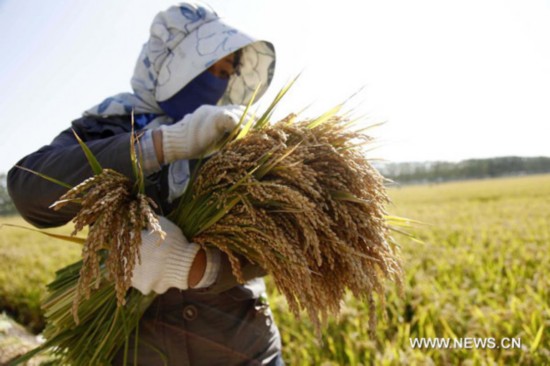


A farmer harvests rice in Guanyun county in Lianyungang city, East China's Jiangsu province, Oct 15, 2013. [Photo/Xinhua]
China will step up its efforts in improving public awareness of genetically modified (GM) technology in agriculture in 2015, according to a key policy document released by the Communist Party of China and the government on Sunday.
The country will strengthen the technical study, safety management and better public awareness of GM technology, noted the No. 1 Central Document, which is focused on agricultural modernization.
Compared with the United States and many South American countries that have freely adopted GM technologies, China has shown a marked reluctance to do so.
Though there is no evidence that GM crops harm human health or the environment and most Chinese know little about these technologies, they seem overwhelmingly to regard them with great suspicion.
Many of the most outspoken critics in the country are celebrities, such as national TV presenter Cui Yongyuan, and their high profiles have helped the campaign against GM organisms gain strong support.
However, in a speech to the Central Rural Work Conference last year, Chinese President Xi Jinping suggested that genetically modified organisms will finally be accepted in China and the technology should be allowed to develop in the country so long as the right caution is exercised.
The No. 1 Central Document refers to the first major policy document of each year released by the Central Committee of the Communist Party of China and the State Council.
This is the 12th consecutive year in which the document has focused on agriculture and rural issues. GM technology has been mentioned six times in the document in past years.
This year's document put more emphasis on "strengthening reform and innovation," compared to the one of 2014, Zhu Lizhi, a research fellow with the Chinese Academy of Agricultural Sciences in a report by Xinhua.
The document highlighted the challenges facing China's agricultural sector, including surging production cost, shortage of agricultural resources, excessive exploitation and worsening pollution. Instead of mainly pursuing high output and relying on resources consumption, China should put equal emphasis on quantity, quality and benefits, and attach importance to competitiveness, technological innovation and sustainable growth, it said.
The goal is to blaze a modern agriculture development path featuring high efficiency, product safety, resource saving and environment friendliness, said the document.
 PLA soldiers operating vehicle-mounted guns in drill
PLA soldiers operating vehicle-mounted guns in drill Beauties dancing on the rings
Beauties dancing on the rings Blind carpenter in E China's Jiangxi
Blind carpenter in E China's Jiangxi Top 10 highest-paid sports teams in the world
Top 10 highest-paid sports teams in the world In photos: China's WZ-10 armed helicopters
In photos: China's WZ-10 armed helicopters UFO spotted in several places in China
UFO spotted in several places in China Certificates of land title of Qing Dynasty and Republic of China
Certificates of land title of Qing Dynasty and Republic of China  Cute young Taoist priest in Beijing
Cute young Taoist priest in Beijing New film brings Doraemon's life story to China in 3D
New film brings Doraemon's life story to China in 3D China-S.Korea FTA sets positive precedent
China-S.Korea FTA sets positive precedent Ferry carrying 458 people sinks in Yangtze River
Ferry carrying 458 people sinks in Yangtze River Mecca of Marxism
Mecca of Marxism Bring them home
Bring them homeDay|Week